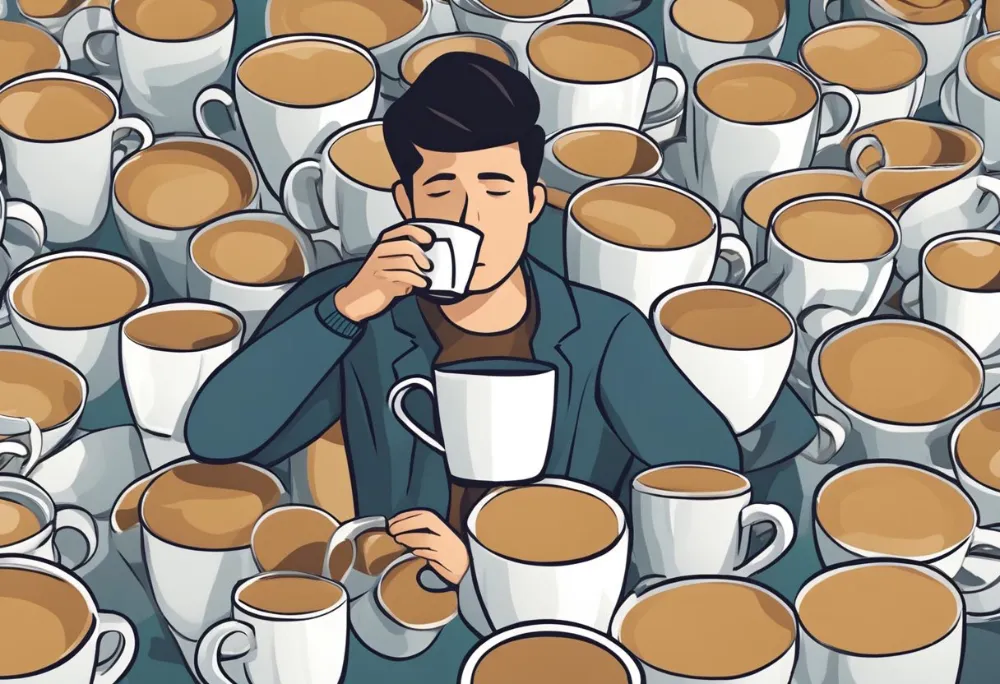Do you find yourself reaching for a cup of coffee or tea every morning before you can even think about starting your day? Do you need another coffee to navigate the afternoon slump and a couple of energy drinks to cheer you up for after-work partying?
If you can’t do without, does it mean you’re addicted to caffeine?
Caffeine is the most commonly consumed psychoactive substance in the world, with millions of people relying on it to help them stay awake, increase alertness, and boost productivity. Whether it’s through coffee, tea, energy drinks, or other caffeinated beverages and products, the consumption of caffeine has become deeply ingrained in our daily routines.
But caffeine is legal and certainly not comparable to other addictive drugs. Whether caffeine is addictive at all is still a controversial issue.
But can that innocent morning cup of joe turn into what some would call a full-blown addiction? In this article, we’ll explore symptoms of caffeine addiction, effects, and treatment options so that you can make informed decisions about your health and well-being.
Key Takeaways
- Whether caffeine is addictive or not is still controversial
- Caffeine addiction is prevalent and can have negative impacts on physical and mental health.
- Addiction occurs when the brain becomes dependent on caffeine to function.
- Withdrawal symptoms, such as headaches and fatigue, can occur when caffeine consumption is reduced or stopped.
- Caffeine addiction can lead to increased anxiety, depression, and sleep disturbances.
- Recognizing addiction and implementing coping strategies, such as gradually reducing caffeine intake, can help break the cycle of addiction.
What is caffeine addiction?
Caffeine addiction can be defined as a physical and psychological dependence on the stimulant effects of caffeine. When consumed regularly over time, the body develops a tolerance to caffeine, requiring higher doses to achieve the same desired effects. This cycle perpetuates the addiction as individuals continue to consume larger amounts of caffeine to avoid withdrawal symptoms.
Caffeine addiction, sometimes also called caffeine use disorder, is a condition characterized by a persistent desire to consume caffeine, unsuccessful efforts to cut down or control caffeine use, and the experience of withdrawal symptoms when caffeine consumption is reduced or stopped. While caffeine is generally regarded as safe in moderate amounts, excessive and regular consumption can lead to dependence and addiction. It is estimated that more than 90% of adults in the United States consume caffeine regularly, with an average daily intake of 200 milligrams, equivalent to two 6-ounce cups of coffee or five 12-ounce cans of soft drinks.
The Controversy Surrounding Caffeine Addiction
Despite the similarities between Caffeine dependency and other drug addictions, some healthcare officials debate whether it can qualify as an actual addiction. In comparison, other addictive substances, such as Amphetamines and Cocaine, stimulate the area of the brain linked to reward and motivation to a greater extent than Caffeine does. Caffeine causes a surge of dopamine within the brain but not a large enough surge to unbalance the reward system in the brain like other drugs. Because of this, the American Psychiatric Association (APA) does not currently identify Caffeine addiction as a Substance Use Disorder (SUD); however, it does recognize Caffeine withdrawal as a clinical condition. The World Health Organization (WHO) became the first medical corporation to recognize Caffeine addiction as a clinical disorder in 2012 formally.
The science behind caffeine addiction
Caffeine blocks adenosine receptors in the brain, which helps promote wakefulness and alertness. Additionally, it stimulates the release of dopamine – a neurotransmitter associated with pleasure and reward – leading to euphoria and increased motivation. Over time, the body can develop an increasing tolerance to the effects of caffeine. Higher doses to generate the same effects may be needed, and the brain can become dependent on caffeine.
Not everyone is affected equally, which may be because of genetic differences.
Symptoms of caffeine addiction
| Symptoms of Caffeine Addiction | Description |
|---|---|
| Headache | A dull or throbbing head pain that can last several hours. |
| Insomnia | The inability to fall or stay asleep often results in fatigue and irritability. |
| Anxiety | A feeling of unease, such as worry or fear, that can be mild or severe. |
| Irritability | A tendency to become easily annoyed or frustrated, often over small things. |
| Restlessness | A feeling of being unable to sit still or relax, often accompanied by fidgeting or pacing. |
| Increased heart rate | A faster-than-normal heartbeat, which can be accompanied by palpitations or a pounding sensation in the chest. |
| Stomach upset | A range of digestive symptoms, such as nausea, vomiting, or diarrhea, that can be caused by excessive caffeine consumption. |
Physical symptoms of caffeine addiction may include headaches upon withdrawal or reduced intake, fatigue or drowsiness without regular consumption, and muscle pain or stiffness due to increased tension caused by excessive stimulation from high levels of adrenaline released by consuming large amounts of caffeinated beverages.
Psychological symptoms can manifest as irritability when not consuming enough coffee or other sources containing significant quantities of caffeine.
It can be challenging to focus when feeling agitated. Anxieties may arise from the inability to cope with stress both physically and mentally without relying heavily on substances that provide temporary relief but ultimately worsen the situation over time due to their addictive nature.
The impact of caffeine addiction on physical health
Coffee is generally considered to have beneficial effects on health and even longevity. This is under the assumption of a reasonable quantity. The FDA considers up to 400 mg of caffeine per day as safe. This corresponds to 4 to 5 cups of coffee. Be aware that energy drinks can contain a lot more. Celcius Heat, Bang and Rockstar Xdurance contain 300 mg per can.
Excessive caffeine consumption can negatively affect the cardiovascular system, including increased heart rate and blood pressure. This puts individuals at a higher risk for heart disease, stroke, and other cardiovascular complications. Caffeine also stimulates the production of stomach acid, which can lead to digestive issues such as acid reflux or ulcers. Furthermore, excessive caffeine intake can disrupt sleep patterns, leading to insomnia or poor sleep quality.
The impact of caffeine addiction on mental health
Caffeine addiction has been linked to various mental health issues. Anxiety and panic attacks are common symptoms experienced by those dependent on caffeine due to its stimulant properties that can exacerbate feelings of restlessness and nervousness. Additionally, excessive consumption of caffeinated beverages has been associated with an increased risk of depression. It is believed that this may be due to the interference with neurotransmitters in the brain responsible for mood regulation.
The social implications of caffeine addiction
Caffeine addiction can have a significant impact on relationships and social interactions. The same applies to professional settings when individuals dependent on caffeine experience difficulty concentrating, irritability, and mood swings. These can make efficiently communicating difficult and impair work performance and productivity.
Conflicts and strained relationships with friends, family, and romantic partners are potential risks. Caffeine addiction can also lead to increased isolation as individuals may prioritize their caffeine consumption over spending time with others.
How to recognize caffeine addiction
Recognizing the signs of caffeine addiction is crucial in addressing the issue. Some common indicators include an inability to function without consuming caffeine, experiencing withdrawal symptoms when attempting to cut back or quit, and an increasing tolerance requiring higher doses for the desired effects.
Coping strategies for caffeine addiction
If you suspect you may be addicted to caffeine, it is important to seek support from healthcare professionals who can provide guidance and treatment if necessary. Treatment for caffeine addiction can help individuals regain control over their lives and improve their overall well-being.
You can also take steps to break free from reliance on caffeinated beverages. One way is to reduce caffeine intake over time rather than quitting abruptly gradually. This approach allows the body time to adjust slowly without experiencing severe withdrawal symptoms that could potentially derail progress toward recovery.
It may also be helpful to explore alternative sources of energy and focus, such as engaging in regular exercise, yoga, or practicing stress management techniques. Seeking support from friends and family members who understand your goals and are willing to encourage you can also make a significant difference in overcoming addiction. A network of individuals who are supportive, encouraging, and understanding will help maintain motivation throughout the process.

The importance of moderation in caffeine consumption
While excessive consumption of caffeinated beverages can lead to addiction with detrimental effects on physical health, it’s essential not to overlook the benefits associated with moderate consumption.
Moderate amounts of caffeine have been shown to improve cognitive function, increase alertness, enhance physical performance, and even provide some protection against certain diseases such as Parkinson’s disease and liver cancer.
Limiting consumption to no more than 400 milligrams per day is recommended for most healthy adults to moderate caffeine intake. This is roughly equivalent to four cups of coffee or ten soda cans. It’s also important to be mindful of hidden sources of caffeine in foods and medications.
Breaking the cycle of caffeine addiction
Recognizing and addressing caffeine addiction is crucial for overall health and well-being. The prevalence of this addiction in society highlights the need for awareness and support systems that can help individuals break free from their dependence on caffeine.
By understanding the science behind caffeine addiction, recognizing its symptoms, and acknowledging its impact on physical and mental health, individuals can take proactive steps toward recovery. Coping strategies such as gradual reduction of caffeine intake, exploring alternative sources of energy, seeking support from loved ones, and practicing moderation are all essential components in breaking the cycle of addiction.
It’s important to remember that change takes time and effort, but with determination, support, and a commitment to one’s well-being, it is possible to overcome caffeine addiction. Seeking professional help, if needed, can provide additional guidance throughout the recovery process. By making positive changes today, individuals can pave the way for a healthier future free from caffeine dependency.






